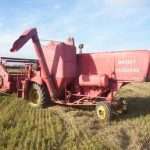The large yellow combine harvester headed northward. Reaching 25 km/h at times, more often its progress was a very sedate 20 km/h. At such a speed, a mere 12 miles per hour, it would have been overtaken by Olympic marathon runners. If it were travelling 26 miles to a farm, a top class athlete would arrive at the destination before the machine came lumbering into the yard.
The road was without verges, hedges rose steeply on either side. A double white line down the middle discouraged thoughts of overtaking, not that it was physically possible with a constant line of oncoming traffic. There was no possibility of pulling over for the driver of the combine, no chance to allow the line of traffic behind to pass. A hundred yards back, a twenty-something in sunglasses, driving a metallic grey car, kept dodging out, as if contemplating an attempt at some stunt record for the number of cars passed in a single manoeuvre on a single carriageway road in the face of approaching heavy goods vehicles; even he was not stupid enough to really try to pass.
Eventually, the combine harvester must have neared its destination, for it turned left onto a side road and the succession of cars following all accelerated. Not a few of the drivers would have muttered about the delay they had suffered.
Further along the road, there was a tractor pulling a trailer laden with as many as thirty round bales, then another drawing a trailer of grain from a field being harvested, then a huge loader fitted with a silage fork, looking more like some war machine than like the farm machinery of the past; each were passed with ease on the bypass around the town.
An uncle, who had worked for an agricultural engineering company, once told of collecting a Massey Ferguson combine harvester in west Somerset in the 1970s and driving it thirty miles or so to its purchaser. The journey had been extremely slow and had taken some hours on narrow and winding West Country roads. ‘I would have hated to have been following me’, he commented.
The aggression frequently displayed by those overtaking suggests sympathy for the drivers of the tractors and the assorted other farm vehicles is not in plentiful supply, but who else going about their daily work is treated with a similar lack of understanding? How would those who clog the arterial routes of the cities every rush hour respond if they were told that they were the object of resentment? How would those who criss-cross the country in their company cars react if they were told that people in local communities were tired at their need to drive everywhere at the maximum possible speed? How would lorry drivers answer complaints about them driving through towns and villages?
Maybe there should be some rule about not judging someone until you have driven a mile in their seat.
